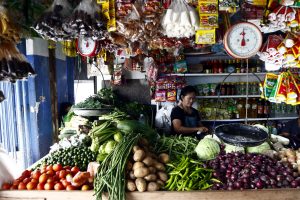The inflation crisis in the Philippines is reflected in the unprecedentedly high cost of onions, which forced the government of President Ferdinand Marcos Jr. to launch rolling stores, release smuggled goods, and import from nearby countries.
Consumers started to notice the rising price of onions in August of last year. Restaurants also complained that suppliers had jacked up prices by at least ten times. The price surge continued until December, when a kilogram of onions became more expensive than an equivalent amount of beef and chicken. A lawmaker even lamented that the world’s most expensive red onion was to be found in local markets.
The impact on ordinary Filipinos is so acute that it led families to prepare food with a very minimal amount of onion during the recent Christmas holiday. Funny memes depicting onion as a luxury gift and symbol of affluence were widely shared on social media. The humor hides the suffering of poor families who are barely surviving amid the rising prices of basic goods and the absence of a substantial wage hike.
The supply shortage is attributed to weather disturbances and the decision of local farmers to plant a different variety of onions. The government has also blamed “unscrupulous traders and hoarders for the unreasonable price of onion.”
Marcos acknowledged how smuggling has undermined the economy and the government’s failure to dismantle the cartel.
“To be brutally frank about it, we have a system but they are not working. The smuggling here in this country is absolutely rampant. So it does not matter to me how many systems we have in place, they do not work,” Marcos said in a speech at the presidential palace.
When prices went up in December, the government imposed a lower “suggested retail price” as it launched rolling stores offering cheaper agricultural products in various parts of the country. Each buyer can only procure three kilos of onions in these government-subsidized stores.
To address the supply problem, authorities allowed the release of confiscated smuggled goods, although Marcos ordered a thorough inspection since some goods were found to be unfit for human consumption.
But the president’s elder sister, Senator Imee Marcos, said that a lower price dictated by the government would only invite ridicule since market prices have soared by four times already. She reminded agricultural officials to use existing funds to “expedite the harvest and direct purchase of locally grown onions for delivery to Metro Manila.”
Prices went down slightly in January as the government announced the importation of 22,000 metric tons of onions.
But opposition Senator Risa Hontiveros said the decision to import would only hurt local farmers since it’s already harvest season. “The importation is being done belatedly. The imports should have been authorized two months ago in time for the holidays. This error is unforgivable,” she said in a statement.
The government clarified that it only authorized a “calibrated importation” to protect the welfare of both farmers and consumers.
The Kilusang Magbubukid ng Pilipinas, an organization of local farmers, warned that “only big importers and traders stand to benefit from this latest importation. Farmers and especially consumers will be at the losing end.”
The Department of Agriculture is “burying alive the domestic agriculture especially small-scale farmers and food producers,” it added.
It also proposed the building of more cold storage facilities and the implementation of a subsidized “store now, sell later” scheme in different provinces.
Meanwhile, opposition Congresswoman France Castro urged the government to “extend support and subsidies to Filipino farmers to increase their yield and lower production costs,” since many are still recuperating from the pandemic-induced economic slowdown over the past three years.
Marcos is at the World Economic Forum in Davos, Switzerland this week promoting the sovereign wealth fund, even if this has yet to be tackled by the Senate. It’s his eighth foreign trip despite being in power for only under seven months. His critics will certainly highlight his frequent trips abroad and the failure of his government to reduce food and agricultural prices. He can’t pass the blame to his subordinates because he appointed himself secretary of agriculture to prioritize food security and other key issues affecting local farmers.

































